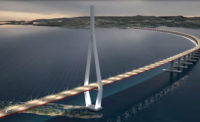But Murphy says many clients are slowly moving back to qualifications-based procurement after being burned by low-cost providers. “This is the continuous feedback we are receiving from those clients,” he says.
Market Turmoil
Global financial and political turmoil has many international designers on edge. “Ongoing uncertainty with the global economy is a concern, as evidenced by the current financial collapse in Greece, the impact of the Chinese economy and, more locally, Australia’s ongoing difficulties,” says David Prentice, CEO of New Zealand’s Opus International.
“Political instability in some regions of the world, as in the Gulf region and geopolitical tensions in Europe, are halting international growth,” says Stéphane Aubarbier, executive vice president of Assystem Group. He says financing issues in developing countries and financial debt in developed countries, especially in Europe, could cause the delay or abandonment of major infrastructure projects.
Global economic turmoil has “led to the overall uncertainty in countries where IBI has a presence, including Greece and China,” says Trevor McIntyre, global director for IBI Group. This uncertainty makes it difficult to define stable markets and ensure business success in these environments, he says.
The financial uncertainty also has made bidding a challenge. “As an international company, fluctuation in currency and changes in global economy are always a concern,” says Park Seung Woo, CEO of Korea’s Dohwa Engineering Co. Ltd. He says the weakening of the Japanese yen has made it harder to compete financially with Japanese firms.
Park also says the European Central Bank’s (ECB) monetary policy may affect payments made in euros. “With the quantitative easing by the ECB caused by the fear of deflation in the eurozone, clients may choose to delay the payment in euros. This would lower our profits while increasing the price competitiveness of European firms,” according to Park.
Despite global market uncertainties, many European firms are doing well. Lars-Peter Søbye, CEO of Denmark’s COWI Group, reports another good year, with orders in the transportation and infrastructure sectors “booming.” COWI has “very healthy growth in areas we want to invest in,” says Søbye, citing Scandinavia, the U.K. and COWI North America, as well as tunnels, bridges and marine markets.
With sales up some 25% and margins up by around 17%, business is “reasonably” good, says Keith Howells, chairman of the U.K.’s Mott MacDonald Groups. “The water sector is good in the U.K. and North America and could be better in other regions, especially Asia,” he notes. Transportation is busy globally, “with lots of people wanting to do metros,” he says.
“The energy markets over the past three years have been very strong,” says McArthur of ARCADIS, citing the Middle East and Asia. The firm has “a very strong position in Brazil,” he adds.
Mott grew to about 16,800 staff after last fall’s acquisition of Bentley Ltd., an 800-person contractor in the water sector that Mott often partnered with. With Bentley, “we have the potential to double the business in the next five years just in the water sector,” says Howells.
Søbye agrees that, with 6,400 staff, COWI is modestly sized by global standards. “Where we can make a difference [is] where we are best in class,” he says. “The big groups really want to … have us on their teams.”
In Europe, the U.K. is “as busy as it has been for some years,” says Howells. Eastern Europe is increasingly a resource base, rather than a source of work, for Mott. “We have been winding down in central and Eastern Europe and, at the same time, growing our business in transportation,” adds Søbye.
Hyundai Engineering Co. of Korea is finding the greatest opportunities in Russia and the Commonwealth of Independent States. “There is high demand in adopting international technologies in the Russian and CIS region as international technologies have been applied for oil-and-gas, refinery and petrochemical plants,” says Kim Wee-chul, CEO.








